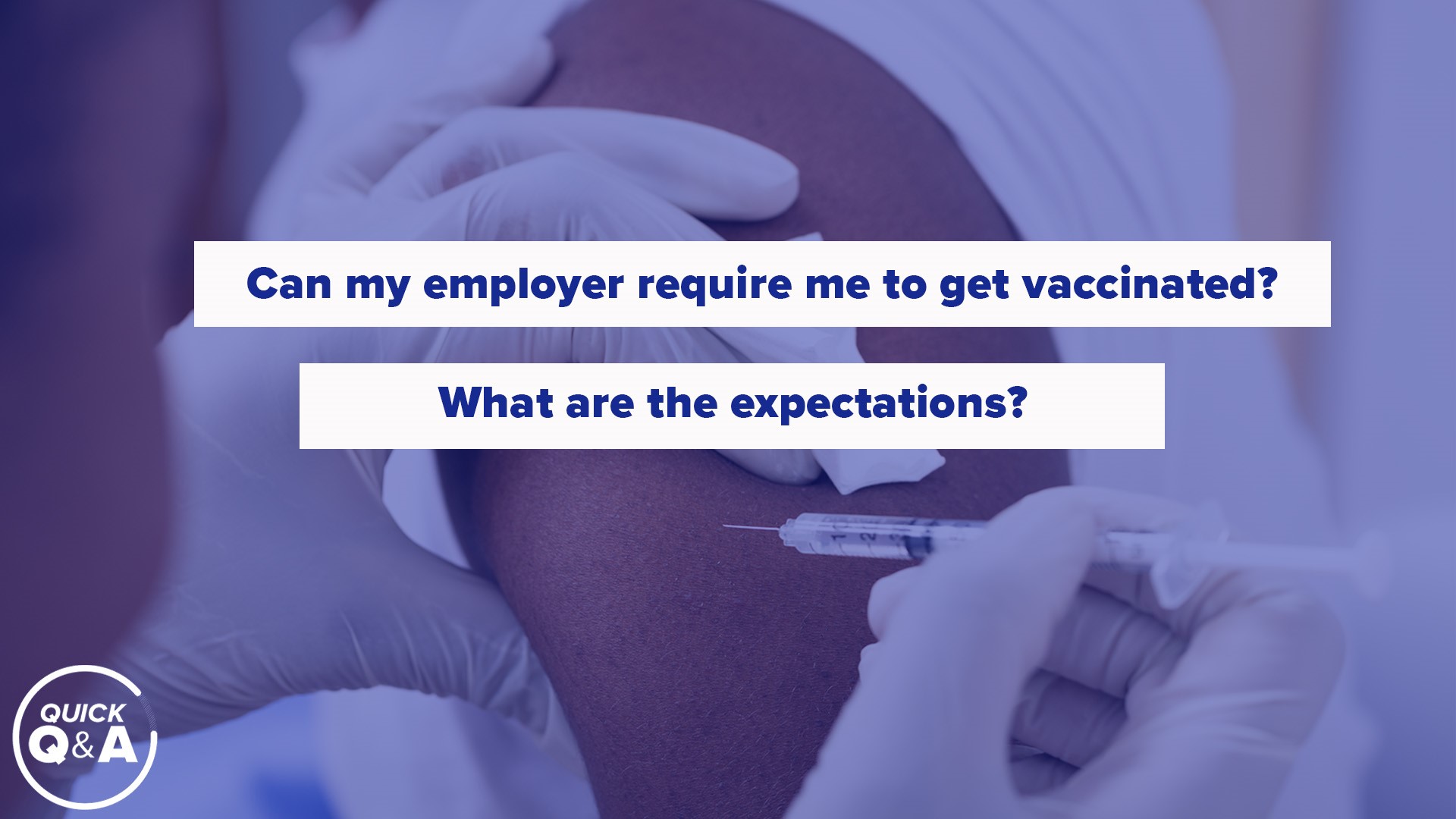WASHINGTON — People all over the world are anxiously awaiting a COVID-19 vaccine that will hopefully slow the spread of the pandemic and eventually halt it entirely.
However, some are concerned about the challenges that will surface once a vaccine is mass-distributed.
Veronica Morris from Hyattsville, Md. texted in and asked what rights employers have when it comes to the vaccine.
TEXT WUSA9 YOUR QUESTIONS at (202) 895-5599.
WUSA9 reached out to Employment Law Attorney Ryen Rasmus at the Lipp Law Firm to discuss whether employers can require employees to receive COVID-19 vaccinations when available, how likely it is, and what the exceptions might be.
QUESTION:
Can an employer require an employee to get one of the new COVID-19 vaccines when they become available?
ANSWER:
It is possible that your employer could require a new COVID-19 vaccine. However, there’s no certainty about what to expect currently.
“The Equal Employment Opportunity Commission, which administers the federal laws most likely to be implicated when it comes to workplace vaccination issues, has not yet issued guidance specific to COVID-19,” Rasmus said in a statement.
“Based on guidance the EEOC previously issued in connection with the H1N1 swine flu pandemic of 2009, however, it is probable that employers will be able to mandate vaccines for their employees, but will have to include certain exceptions based on existing law.”
Q: What are the exceptions?
A: If an employee has a medical reason for foregoing a vaccination under the Americans with Disabilities Act, an employer likely couldn’t require they do so anyway. This would also apply if someone can show they have religious beliefs that are against receiving a vaccination. Under Title VII of the Civil Rights Act, an employer would likely have to resort to reasonable accommodations, such as permitting an employee to continue working remotely.
However, both of these situations would be on the employee to prove.
“Note that mere discomfort with the idea of a vaccination is not enough to entitle an employee to accommodation -- employees will have to show that they have a bona fide diagnosis with a condition that makes vaccination risky, or a sincerely held religious belief relating to vaccination.”
Q: Can an employee who qualifies for an exception demand the option to work from home forever, for instance, or have their own office space constructed?
A: Even those who qualify for accommodations aren’t guaranteed to receive any specific accommodations they personally prefer.
“Accommodations need only be reasonable, meaning that if the accommodations requested would place a material strain on the employer's business, the employer does not have to offer them. If an employee is unable or unwilling to perform the employee's duties even with reasonable accommodations having been offered by his or her employer, the employer is allowed to take adverse action against the employee, including terminating his or her employment.”
Q: Does this change across the D.C. metro area?
A: Rasmus explained that Virginia, Maryland, and D.C. all have state laws that prohibit discrimination in the workplace on the basis of religion and disability that are similar to federal laws.
Q: So an employer could require a vaccine... but is it likely?
A: Just because your employer can, doesn’t mean that they will, according to Rasmus.
“Since both ADA and Title VII analyses are fact-specific and can come with steep penalties for employers if misapplied, many employers are expected to strongly encourage vaccinations rather than administering mandatory programs with the required exceptions included.”
Q: Regardless of whether someone is strongly encouraged or required, what options does an employee have if they are uncomfortable getting vaccinated?
A: “One of the first options would be to consult a physician to ensure that the employee has a complete and accurate understanding of potential effects a vaccine could have on his or her health, as employers are likely to require documentation from a medical professional if an employee seeks an accommodation under the ADA,” Rasmus explained.
“If an employee does have an ADA-protected health condition or Title VII-protected religious belief and wants to seek accommodation, the employee should give his or her employer as much advance notice as possible.”
It may also be helpful to have an honest conversation about concerns with an employer regarding vaccinations to see what options might be possible.
“Employers can voluntarily make accommodations for employees who merely wish to opt-out of vaccination for personal reasons. These accommodations might include the opportunity to work from home, a dedicated workspace in the office away from others, provision of personal protective equipment, etc,” Rasmus said.
Q: What employers are more likely to require a vaccine?
A: Rasmus said that it’s more likely that some larger employers — particularly those in high-contact industries like hospitals, schools, and retail — would have mandatory vaccination policies. However, “for many small businesses, the headache of implementing and maintaining a mandatory program is likely to outweigh the benefit,” he said. “I'd expect to see policies more similar to those dealing with seasonal flu shots, that is, policies that encourage employees to get the inoculation and provide education and resources but don't make anything mandatory.”
Rasmus explained that, ultimately, we’ll have to wait and see if anything changes before vaccines become widely available.
“The Occupational Safety and Health Administration is already being vocal about the benefits of vaccination. It is possible that concerns regarding workplace safety may prompt new laws or regulations regarding vaccination, or that employers will become more concerned about claims from employees working alongside non-vaccinated colleagues than they are about discrimination claims from those who oppose the vaccine.”

